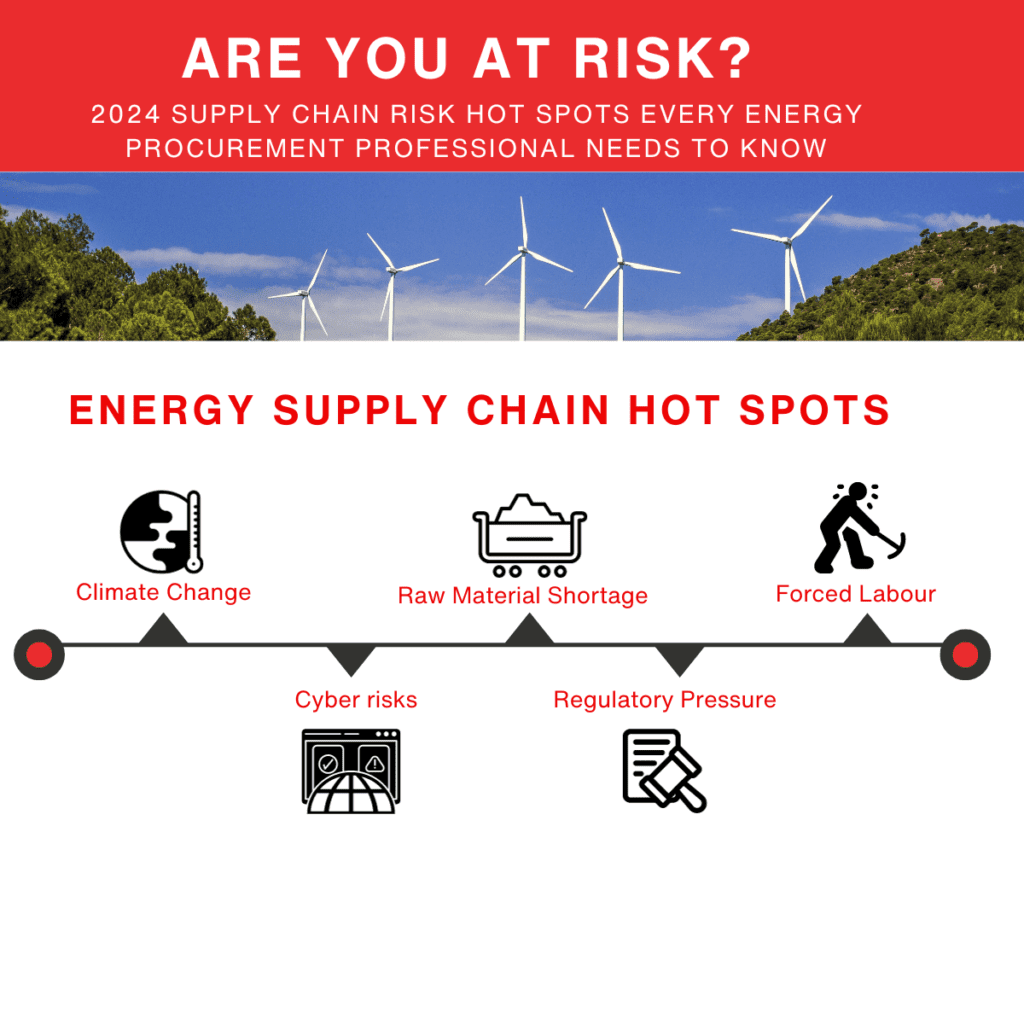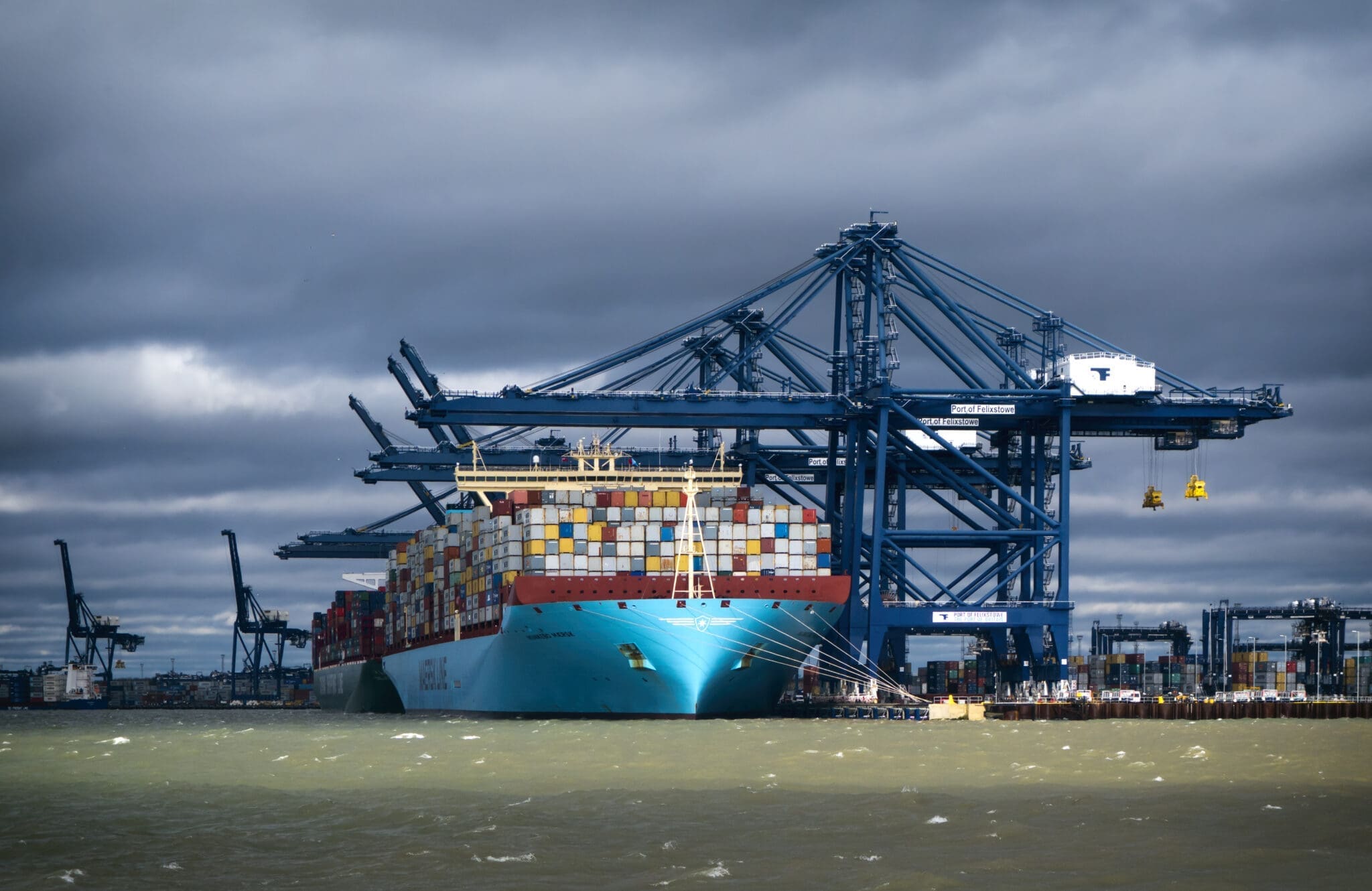Risks that are shaping the energy sector
As the energy industry works to transition away from fossil fuels to renewables, energy procurement requires new types of upstream and downstream energy supply chains to support new types of infrastructure, energy generation and distribution. With this comes new types of potential risks and impacts. With fierce competition creating supply bottlenecks we are seeing rising costs. When this is paired with the emerging legislative backdrop, it has never been more important to understand where your supply chain could potentially be at risk.
As we look to a future shaped by sustainability and efficiency, our infographic, “2024 Supply Chain Risk Hot Spots Every Energy Procurement Professional Needs to Know,” offers an overview of some of the high risk areas that professionals need to be aware of.
A report from WTW is an interesting insight into the current energy supply chain landscape. It delves into current obstacles and risks decision makers in the energy sector are currently trying to build resilience against.
As well as the infographic read on for a more detailed review of the energy supply chain and the approach that you can take towards mitigating the risks.
Supply Chain Risk Hot Spots- What does the landscape look like?
Climate Change and Its Implications
The energy sector is on the frontline of scrutiny when it comes to tackling climate change. Climate scientists are saying the world needs to cut carbon dioxide emissions to 45% by 2030. The impact is not only from a sustainability perspective. According to CDP Disclosure Insight Action by 2026 there will be costs of $120B facing companies as a result of environmental risks.
Addressing its impacts requires a strategic approach to make sure that supply chains remain resilient and can adapt. According to our Global Sustainability Priorities Survey, 52% of buyers do not currently have a carbon reduction strategy. This is a surprisingly low number considering the current political and social spotlight around this topic. Achilles offers a great option to support companies tackle this. Our carbon reduce programme offers businesses the chance to reduce their carbon emissions by 50%. Alongside this is the opportunity to showcase a commitment to tackling climate change with a ISO 14064-1 certification.
The Challenge of Raw Material Shortage
As we transition to sustainable energy sources, the scarcity of raw materials emerges as a major supply chain risk. Particularly in the renewable energy space the demand for materials such as lithium, cobalt and graphite is set to raise by up to x7 by 2030. Price volatility is a direct factor resulting from this effecting procurement professionals.
Our latest Supply Chain Resilience Index Report shows that while non energy sector price volatility eases, energy prices remain the most unpredictable. In order to navigate this challenge proactively measures can be taken. What is clear, is that as the demand for raw materials increases so will the cost. The best way to mitigate that risk is by mapping out and having a clear picture of your supply chain. This in turn will help you to quantify the impact of shortages and price fluctuations. Achilles offers a comprehensive supply chain visibility solution that gives you the deepest view of your chain to identify and mitigate risk.
Forced Labour and Ethical Supply Chains
According to the ILO nearly 50 million people are living in modern slavery, of which almost 28 million are in forced labour. This is a clear indicator that forced labour should be on every energy procurement professionals radar. If this ethical implication wasn’t enough of a driver, then possible reputational damage should be a core concern. A number of global solar producers for example, were put under public scrutiny after being found to be implicated in forced labour. Our commitment to ethical supply chains reflects our dedication to corporate responsibility and social values. At Achilles we collect and analyse data from a wide range of sources including in person audits. This ensures you see not only what has happened in the past but, more importantly, where your risks might lie in the future.
Regulatory Pressures
Keeping pace with the evolution of regulatory landscapes is another factor to consider. There are a number of global legislations such as Lieferkettengesetz, CSDDD, Bill S-211 and BRSR and Åpenhetsloven coming into play on a global scale. The complexities of knowing when is enough, enough can become eyewatering. These complex legislations normally require a risk-based approach to due diligence across supply chains. These supply chains are often multifaceted across multiple continents. If you are a business where there is no legislation in play, you shouldn’t write it off as non-applicable. If you operate on a global scale then the new legislations are bound to impact your supply chains.
Cybersecurity in the Digital Age
As digital transformation accelerates, having access to the right kind of accurate, high-quality data is the cornerstone of business success. Without the right safeguards in place, data can also be an important vulnerability. Supply chain attacks pose a significant threat to businesses of all sizes. They allow threat actors to gain access to an organisation’s network through a third-party vendor or supplier and cause various damages. Take for example Colonial Pipelines who in 2021 had to pay $4.4M ransom just to resume normal operations. As a BSI accredited business, Achilles are experts in cyber security. Achilles makes sure that the data you and your suppliers rely on is being stored, shared and utilised in line with best practices and industry standards.
Download our infographic that highlights the key hotspots to look out for. Please also contact us to discuss how Achilles can support you in mitigating your supply chain risks.



